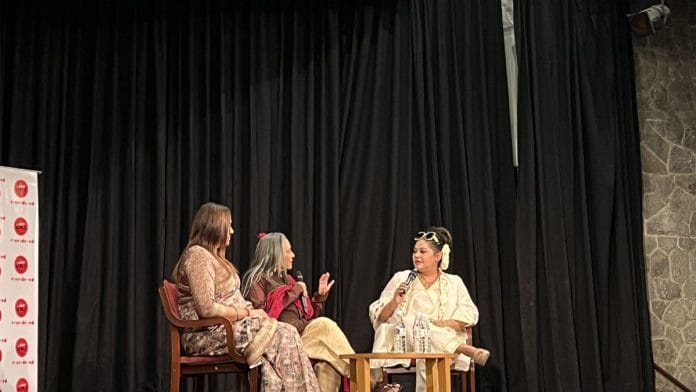New Delhi: If Bertolt Brecht envisioned art as a hammer shaping reality, then filmmaker Deepa Mehta wields her camera as a tool. And she does it with a force no less than a Brechtian hammer in her documentary, I Am Sirat.
Her camera tracks transwoman Sirat Taneja—the co-director of the film—who is caught between the duality of duty and self-determination. Taneja has to revert to her discarded male identity when she has to take care of her ailing mother in New Delhi.
“I think it’s interesting that self-determination in women is always seen as selfish,” said Mehta at the premiere of I am Sirat at New Delhi’s India International Centre (IIC).
More than 25 years after her movie Fire (1996)—on the relationship between two women–saw Right wing groups and political parties vandalise theatres across India, Mehta is still interrogating gender discrimination.
Sirat, the protagonist of the documentary, lives as her true self. She is a proud transgender woman out in the world. But in her small West Delhi home, she is performing a pre-assigned identity in front of her mother. She had tried telling her mother about her identity seven years ago, Sirat says in the documentary. But that drew violent anger from her uncles. Her mother said that it was better to kill Sirat than see her become a woman.
“The subjects that I ended up making movies about have always been decided by my curiosity,” said Mehta during the pre-screening chat with Myna Mukherjee, the founder and director of Engendered, a New York/New Delhi-based transnational arts and human rights organisation.

From the protagonist’s lens
Mehta met Sirat four years ago while directing the Netflix series Leila where she had been cast as a trangender guard. Sirat asked the filmmaker if she would tell her story. All she wanted was acceptance—from her mother, her family, and society.
One of the many things that I Am Sirat gets right is the way it handles the thorny question of representation. Shot entirely on a smartphone, the 87-minute long documentary is a true collaboration between the two women. It premiered at the Toronto International Film Festival in 2023 to critical acclaim.
Sirat records herself in portrait mode while Mehta shoots on her phone horizontally, leading to a play on form and aspect ratios. As Sirat herself says in one of the scenes, if someone else tells her story they’ll inevitably put their own angle to it. They’ll ask her questions like “what made her transition?”
“But as transgenders, these questions don’t even occur to us,” says Sirat, looking past the camera, to Mehta. But this representation is not just restricted to grimmer political questions or to prove a specific point.
Sirat had the audience at IIC’s CD Deshmukh Auditorium laughing and humming along with her as she lip-synced and danced away to Punjabi and Hindi hits on screen.
“I’d take note of which songs had the most views and likes on Instagram,” she told the audience, post-screening.
According to Mehta, even before the making of the documentary, Sirat was very comfortable with the camera because of the buzzing world of Instagram reels. We see Sirat proudly claiming the space by recording not only reels but also informational videos on the importance of getting a TG (Transgender) certificate and ID Card. She’s equally at ease—and authentic– talking about the physical problems a person may face after transitioning.
Also read: The Mughals are overdone in historical fiction. Time to focus on Delhi Sultans
Love, heartbreak, acceptance
At its core, I am Sirat is a story of a woman who is bold, wickedly funny and unapologetically herself.
It’s also a story about love. As she battles through whatever life throws her way, there is always a web of support and compassion around her. Be it Varun, one of the colleagues at her job in the National Institute of Social Defence, who she affectionately calls “silly” or the friends she met at a gay party . There’s also Amit, who she jokingly calls Anamika, and Samar. The friendships are a treat to watch.
One person who especially leaves a sweet aftertaste is Sirat’s aunt. She’s a mother, a wife and runs a salon in Delhi which becomes Sirat’s safe haven. In a particularly heartwarming scene, she dresses Sirat up for the wedding of a family member. In the auditorium, when Sirat walks toward the camera revealing the final look, the audience let out a collective gasp. She was wearing a gorgeous sequined lehenga, perfectly done hair and makeup, topped with her familiar dazzling smile.
But there’s heartbreak as well. In a vulnerable moment in the documentary, Sirat talks about the man she fell in love with, Vasu. “Behind closed doors I was his woman,” Sirat said. But patriarchy and societal shame meant their love story had to end.
Sirat points to the scar at her hand, a reminder of the time she harmed herself after she got her heart broken. There’s now a tattoo etched upon there, which says Maa.
I am Sirat forces viewers to question their own prejudice and preconceived notions. It pushes us to acknowledge the need for stronger laws.
“All good art is political,” said Mehta quoting Toni Morrison while discussing the film.
From fashion designer Ritu Kumar to artist and curator Sujoy Prasad Chatterjee, familiar faces congratulated Mehta after the end credits rolled. There was an outpouring of love from the audience, which included young faces from Delhi’s queer community. Sirat’s aunt and her family were seated in the first row. In the end, as Sirat came on stage, an elderly woman from the audience shouted, “We are proud of you, Sirat!”
But there was one question that the documentary didn’t answer. Did Sirat find acceptance? Her mother knows about the film, and is starting to understand its importance.
“The day before yesterday, my mom called me and said, ‘Your face has started looking like a girl!’,” said Sirat, beaming at the delighted audience.
(Edited by Ratan Priya)






